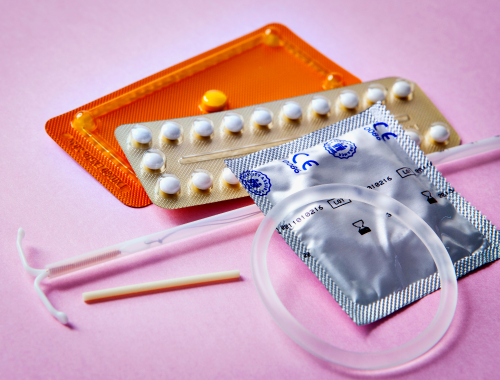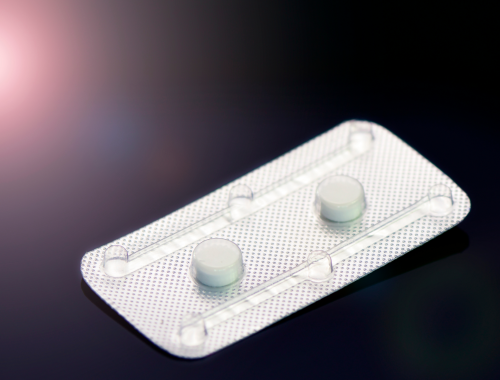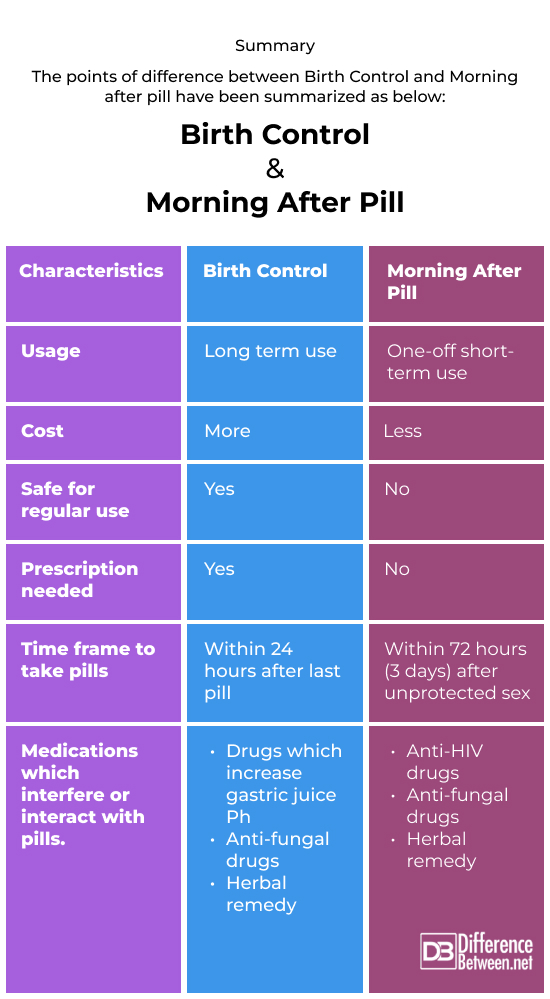Difference Between Birth Control and Morning After Pill
The morning-after pill should not be used as a regular form of contraception, despite the fact that it can help lower the risk of pregnancy following unprotected intercourse. When used as directed, regular birth control techniques are more dependable and provide continuous protection against pregnancy.

Birth Control
One form of oral contraceptive that employs hormones to prevent conception is the birth control pill. Oral refers to ingesting it via mouth. Birth control refers to any method or instrument used to prevent pregnancy, including contraception. Because it comes in an easy-to-take pill form, people refer to it as “the pill.” The tablet is simply one component of many people’s daily routines.
When used as directed, birth control tablets can prevent conception 99.9% of the time when taken daily. Contrary to other birth control methods, such as condoms, the pill offers no protection against STIs. Along with the pill, you’ll need to utilize extra protection to lower your risk of contracting STIs.

Morning after pill
Emergency contraception, also known as the morning-after pill, is a type of birth control used in cases of unprotected sexual activity or contraceptive failure. It is not intended to be used as the primary method of preventing pregnancy, but rather as a backup strategy. The morning-after pill consists of two ingredients: levonorgestrel (Plan B One-Step) and ulipristal acetate (ella). While ulipristal acetate requires a prescription, levonorgestrel can be obtained over-the-counter.
Similarity
Both pills prevent pregnancy.
Difference between birth control and morning after pill
Purpose
Birth Control
The goal of contraceptive methods is to halt conception before it begins. They can provide continuous contraception when used consistently. Birth control is available in many forms: hormonal (such as injections, pills, and patches), barrier (such as diaphragms and condoms), intrauterine device (IUD), and permanent (such as vasectomy or tubal ligation).
Morning after pill
An over-the-counter method of contraception – the morning-after pill is taken after unprotected sexual activity or when a contraceptive strategy fails to reduce the risk of pregnancy. It is intended to be used as a last resort in the event that other methods of contraception are ineffective or are not used, not as a continuous approach.
Availability
Birth Control
While many birth control methods need a prescription, some, like condoms, can be bought over-the-counter. They are available in advance and can be utilized frequently.
Morning after pill
The morning-after pill is accessible without a prescription over-the-counter in several countries. In certain locations, there can be age limitations, and it can also be acquired with a prescription.
Ingredients
Birth Control
The hormones (e.g., progestin and/or estrogen) or other mechanisms used in birth control procedures work to block fertilization, thicken cervical mucus, or prevent ovulation.
Morning after pill
Emergency contraception may prevent or interfere with fertilization by acting through different processes, or it may contain a greater dose of the hormones levonorgestrel or ulipristal acetate, which are present in certain normal birth control tablets.
Effectiveness
Birth Control
When used correctly and consistently, birth control methods can be highly effective at preventing pregnancy. The effectiveness varies depending on the method used.
Morning-After Pill
The effectiveness of emergency contraception depends on when it is taken after unprotected sex. The sooner it is taken, the more effective it is. However, it is not as effective as regular birth control methods and is not guaranteed to prevent pregnancy.
Timing
Birth control
These techniques offer ongoing protection against pregnancy by being taken or used on a regular basis, in accordance with a set schedule. Depending on the procedure, they can be used weekly, monthly, or less frequently.
Morning-After Pill
Although many kinds of emergency contraception are effective for up to 120 hours (5 days) following sexual activity, it is best to start taking it as soon as possible after unprotected sex, preferably within 72 hours (3 days). It is not intended for continuous, daily use.
Summary
The points of difference between Birth Control and Morning after pill have been summarized as below:

FAQ:
Is birth control the same as the morning-after pill?
An emergency contraceptive option is the morning-after pill. For women whose birth control method did not work or who have engaged in unprotected sexual activity, emergency contraception is used to prevent pregnancy. You should not use the morning-after pill to prevent pregnancy as your main contraceptive strategy; it is only a backup option.
Is 2 birth control the same as Plan B?
Even though two birth control tablets won’t be enough to prevent pregnancy, some brands can be used as emergency contraception at larger dosages. Check out this chart to find out which pill bands are suitable for use as emergency contraception.
How many birth control pills equal a morning-after pill?
If you want to use birth control tablets as emergency contraception, you need to take two doses, separated by 12 hours.
Is Plan B as effective as birth control?
No. ECPs should not be used regularly as contraception because they do not provide adequate protection against STIs, do not prevent pregnancy for future intercourse, and are not very effective.
What causes morning after pill to fail?
Your emergency contraceptive pill won’t work if you have sex either before or after your period. It could not work if you have unprotected sex again within the same cycle after taking the pill.
Does morning after pill work during fertile days?
It’s crucial to remember that morning-after supplements are meant to postpone ovulation and should not be taken during this time. Any other emergency contraceptive tablet will not work at all if ovulation has already started. That being said, sometimes it’s hard to tell if you’re ovulating.
Does the morning after pill ruin your cycle?
Using the morning after pill can affect your menstrual cycle in different ways. While some women will experience no changes, others may find their cycle quite different from their usual length or heaviness.
Is taking the morning after pill bad?
The morning-after pill is super safe. Out of millions of people who’ve taken it, no serious problems have been reported. There’s no problem if your next period differs from what you’re used to after taking the morning-after pill.
- Difference Between Global Warming and Greenhouse Effect - May 18, 2024
- Difference Between Vaccination and Immunization - March 3, 2024
- Difference Between Selective Mutism and Autism - February 25, 2024
Search DifferenceBetween.net :
Leave a Response
References :
[0]Bentancor, A., & Clarke, D. (2017). Assessing plan b: The effect of the morning after pill on children and women. The Economic Journal, 127(607), 2525-2552.
[1]Djerassi, C. (2006). Chemical birth of the pill. American Journal of Obstetrics & Gynecology, 194(1), 290-298.
[2]Del Bò, C. (2012). Conscientious Objection and the Morning‐After Pill. Journal of Applied Philosophy, 29(2), 133-145.
[3]Image credit: https://www.canva.com/photos/MADmTKYC9fM-birth-control/
[4]Image credit: https://www.canva.com/photos/MADPv4aQq9Q-emergency-contraceptive-pills-morning-after-pills-or-post-coital-pills-on-dark-background-/
